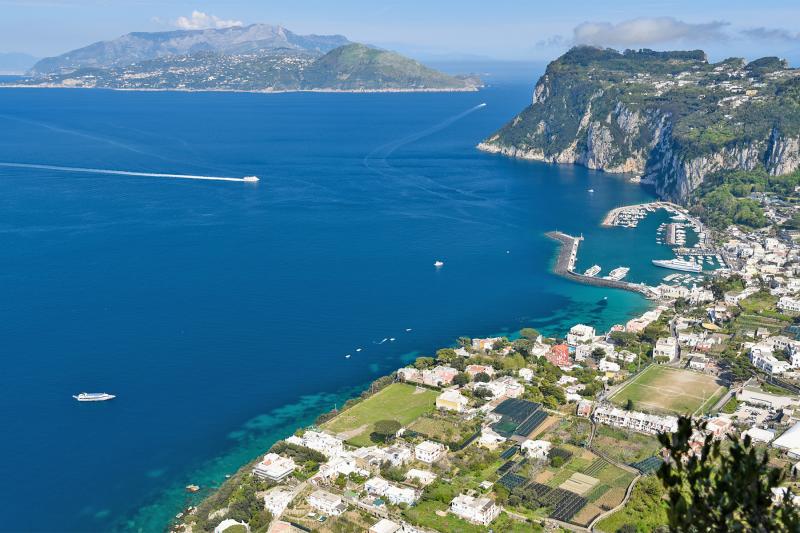Rick Steves’ Europe: Romantic Italy: Amalfi Coast and the Isle of Capri
Appears in the Online Edition, January 2022.
Along the heights of the Amalfi Coast in Italy, every inch is terraced, connected by steep stony staircases that tempt visitors with twinkling — but treacherous — Mediterranean views. Climbing through terraced orchards of lemon trees, I’m hot and thirsty, fantasizing about fresh-squeezed lemonade.
And then, just like a fairy tale, I come upon the daughter of a farmer who seems to be waiting for a lost and parched American traveler. She welcomes me to her terrace to join her for a little slicing and squeezing. Then, as if teaching me a very important life skill, she demonstrates how you halve your lemon, stab it with a knife, and then — cupping the fruit with one hand — you wiggle the knife with the other, and watch the juice fill your glass. She adds lots of sugar, gives it a good stir, and hands me a glass of lemonade I’ll never forget. As I drink, she quizzes me about my journey. It’s one of those moments you travel for.
I’m staying in Sorrento, a town wedged on a ledge between the mountains and the sea. An hour south of wild and crazy Naples, Sorrento feels like its opposite: calm and genteel.
Crowding onto the early bus for the ride along the Amalfi Coast, I sit on the right, primed for the big coastal views and bracing myself for one of Italy’s great thrill rides as we make our way to Positano. The trip gives me respect for the engineers who built the road — and even more respect for the bus drivers who drive it. Maybe I’m just hyperventilating, but I’m struck by how the Mediterranean, a sheer 500-foot drop below, twinkles. Cantilevered garages, hotels, and villas cling to the vertical terrain. Exotic sandy coves tease from far below, out of reach.
Early the next morning, riding the 30-minute ferry from Sorrento, I head for the enchanting isle of Capri. I think of the rich and famous who’ve headed to the same island over the centuries.
Today, Capri is expensive and glitzy — and a world-class tourist trap. Landing on the island, I’m met with a greedy line of white convertible taxis, eager to sweep me away. Zigzagging up the cliff with the top down, I think that despite its crowds and commercialism, Capri is still flat-out gorgeous. Chalky white limestone cliffs rocket boldly from the shimmering blue and green surf. Strategically positioned gardens, villas, and viewpoints provide stunning vistas of the Sorrentine peninsula, Amalfi Coast, and Mount Vesuvius.
To give my Capri visit an extra dimension, I take the scenic boat trip around the island. It’s cheap and comes with good narration. Riding through the pounding waves, I work on my sunburn as we circle the island, marveling at a nonstop parade of staggering cliffs and listening to stories of celebrity-owned villas. There are also some quirky sights: a solar-powered lighthouse, statues atop desolate rocks, and caves in the cliffs with legends reaching back to the time of Emperor Tiberius.
The last stop is the highlight: the fabled Blue Grotto, with its otherworldly azure water. At the mouth of the grotto, a covey of dinghies jockeys to pick up arriving tourists, who need to disembark from their larger transports. The grotto’s entrance hole is small, so only these little rowboats can fit through. If the tide’s too high or the chop too rough, dinghies can’t get in, and visitors are turned back.
Nervous that the waves will close it down, I gingerly climb into my dinghy and my raffish rower jostles his way to the tiny entry. He knows enough English to explain to me (jokingly, I think) that if I don’t scrunch down below the gunwales, I’ll smash my skull on the rock and, as I’ve already paid, that was no concern of his. Taking a moment to feel the rhythm of the swells and anticipating the instant when the dinghy reaches the low point, he pulls hard and fast on the old chain, and we squeeze — like birthing in reverse — into the grotto.
Inside, it takes my eyes a moment to adjust to the brilliant blue of the cave’s water (an effect caused by sun reflecting off the limestone at the bottom). As my man rows me around, singing a little “O Sole Mio,” I enjoy the iridescent magic of the moment.
Beaches, boutiques, blue grottos, and fresh-squeezed lemonade — it all combines to make clear why, for centuries, holiday-goers have chosen this corner of Italy to make their Mediterranean travel dreams come true.
(Rick Steves (www.ricksteves.com) writes European guidebooks, hosts travel shows on public TV and radio, and organizes European tours. This article was adapted from his new book, For the Love of Europe. You can email Rick at rick@ricksteves.com and follow his blog on Facebook.)

